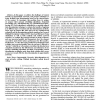Free Online Productivity Tools
i2Speak
i2Symbol
i2OCR
iTex2Img
iWeb2Print
iWeb2Shot
i2Type
iPdf2Split
iPdf2Merge
i2Bopomofo
i2Arabic
i2Style
i2Image
i2PDF
iLatex2Rtf
Sci2ools
118
Voted
JSAC
2008
2008
A content-centric framework for effective data dissemination in opportunistic networks
In this paper, we address the challenges of content transfer in opportunistic networks, and propose techniques to better facilitate data dissemination based on the characteristics of the content. To investigate this problem from its origins, we propose three message scheduling algorithms: Sequential Forwarding (SF), Full Interleaving (FI), and Block-based Interleaving (BI). Each algorithm is embedded in a specially tailored data dissemination technique to evaluate the benefits of applying it to different types of content and data dissemination methods. Three types of content (file, video and web) are considered and evaluated, and the dissemination methods considered are Layered Multiple Description Coding (LMDC) based and file-based. Using simulations as well as both synthetic and realistic network scenarios, we evaluate the proposed schemes in terms of latency and user perceived quality, and demonstrate how the schemes can achieve much better latency performance for file transfers. Fu...
Related Content
| Added | 13 Dec 2010 |
| Updated | 13 Dec 2010 |
| Type | Journal |
| Year | 2008 |
| Where | JSAC |
| Authors | Ling-Jyh Chen, Chen-Hung Yu, Cheng-Long Tseng, Hao-Hua Chu, Cheng-Fu Chou |
Comments (0)

